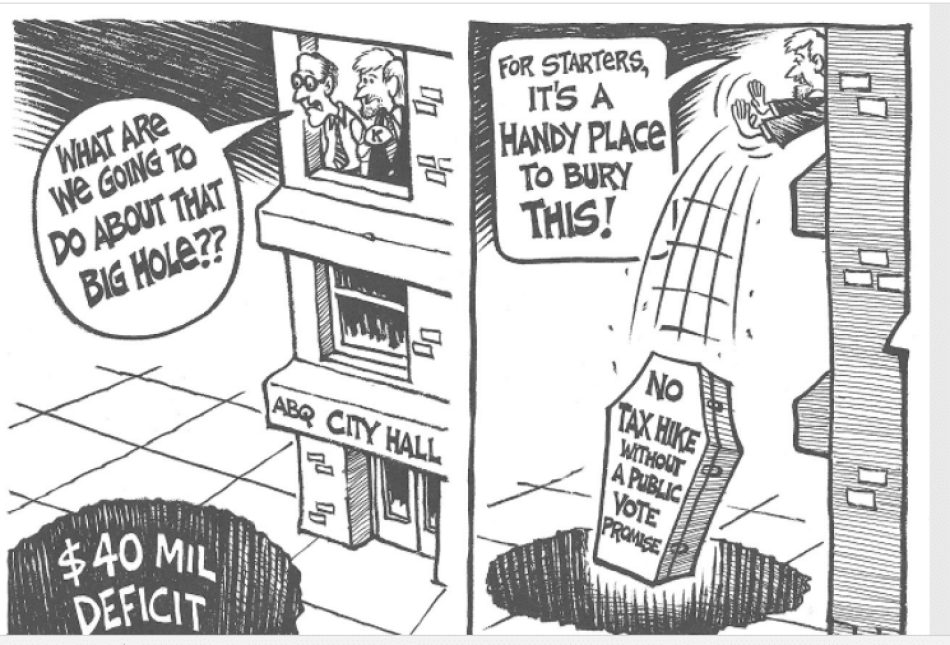
This article appeared in ABQ Biz First on Monday, March 5, 2018.

Albuquerque’s City Council will soon vote on yet another gross receipts tax (GRT) hike.
If adopted, the rate will have risen from 5.8125 percent to 7.875 percent, a nearly 52 percent increase, since 2000. Those tax hikes include taxes levied by the state, county and city, but the money to pay comes from the same place: local taxpayers.
The claim is that city tax revenues have been impacted by eliminating taxes on groceries. Subsequent “hold-harmless” payments from the state have since been put on a glide-path to elimination by Gov. Susana Martinez and the Legislature. About $7 million in annual city revenue has been lost so far. That number will rise to $9.5 million next year and will rise further after that as the “hold harmless” payments are completely eliminated. Meanwhile, the proposed tax hike is expected to raise anywhere from $22 million to $55 million next year.
While dealing with lost revenue is a challenge, it would be even worse to again raise taxes with the local economy already struggling. According to the Bureau of Labor Statistics, Albuquerque had 397,400 nonfarm jobs in December 2017. The number of people working in Albuquerque today is lower than it was way back in October of 2008 as the Great Recession was just beginning to take hold.
Raising taxes again will not help our economy recover.
It is worth pointing out again that the GRT is “regressive.” With all the talk about improving the lives of the poorest and most vulnerable in our community, the GRT takes a greater percentage from their pay than it does from wealthier people.
The Rio Grande Foundation recently examined the city’s finances and found many opportunities for fiscal reforms that would eliminate the “need” to raise taxes.
Personnel expenditures comprise 49 percent of the annual budget and offer the most opportunities for savings.
Eight out of every 10 nonseasonal city employees are covered by collective-bargaining contracts. Union agreements regularly mandate wage increases regardless of employee performance, a practice that is all but unknown in the private sector.
● “Retiring” city employees are allowed to monetize unused paid leave – the Albuquerque Journal has reported that longtime city employees often retired and walked away with tens of thousands of dollars in pay for unused leave.
● Employee contracts also require “longevity pay,” a benefit that North Carolina’s former governor noted private-sector workers have no knowledge of.
● Taxpayers cover a significant share of the “employee” portion of pensions – in the 2016 fiscal year, the city was legally required to commit $33.3 million to retirement, but its actual payment was $60.2 million.
The city has ample opportunities to shift management of properties and facilities (noncore government services) to improve efficiency. Examples include:
● The Sunport and Double Eagle II Airports can be transferred to private enterprise under the federal government’s Airport Privatization Pilot Program.
● The Albuquerque Convention Center, a money-losing white elephant, should be offered to any buyer that has the potential to use the property to generate more jobs and greater tax revenue.
● Four city-owned golf courses are plagued by declining revenue and rising expenses. They should be transferred to private management or sold off entirely.
● Setting aside the boondoggle that is Albuquerque Rapid Transit, the city’s bus system is losing ridership. It is time to work with nimble, efficient entrepreneurs to secure point-to-point transportation for disabled and/or low-income residents who need transportation. A new transit architecture that emphasizes flexibility and affordability – managed by capable, technologically savvy firms – should be adopted.
● Many New Mexico cities, including Rio Rancho, contract out solid waste, a reform that has been shown to reduce costs and improve safety. If the city’s Solid Waste Management Department cannot compete with a private firm, it should be eliminated.
The city could also be more business-friendly. Licensing and permitting issues make doing business more difficult than necessary. After facing delays in permitting at his Green Jeans Farmery, developer Roy Solomon said he’d never do another project in Albuquerque again. When developers say things like that in the media, others take note. That means lost jobs and tax dollars for our city. Undertaking serious reforms would help generate new tax dollars for the city (without raising taxes).
The city is not growing economically. Raising taxes will cause more businesses to look elsewhere for opportunities, which will in turn reduce tax revenue. That will spur politicians to look for additional revenue by hiking taxes. It’s called a “death spiral,” and it’s not pretty. We must do better.
Gessing is the president of New Mexico’s Rio Grande Foundation. The Rio Grande Foundation is an independent, nonpartisan, tax-exempt research and educational organization dedicated to promoting prosperity for New Mexico based on principles of limited government, economic freedom and individual responsibility.
